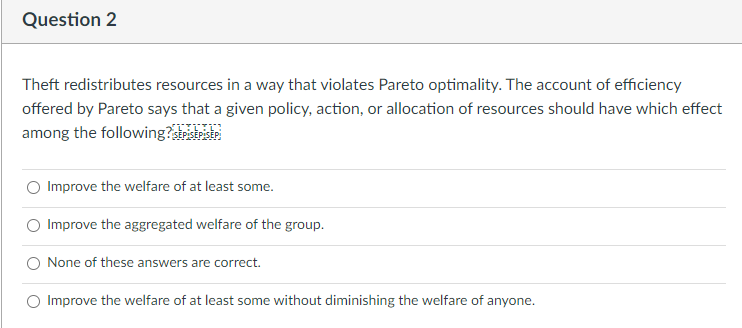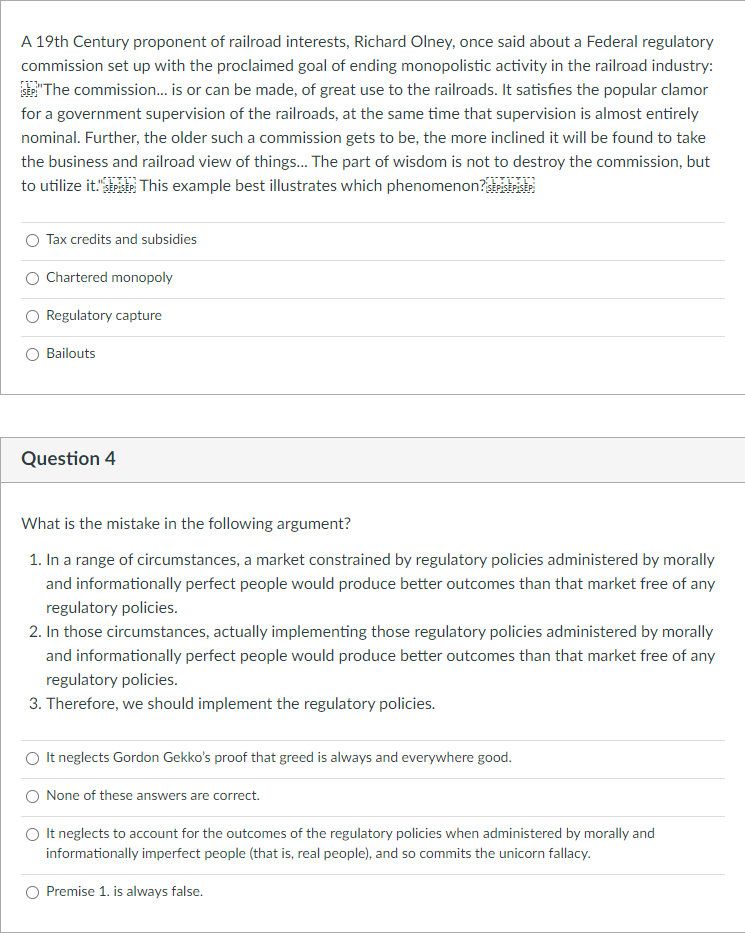Theft redistributes resources in a way that violates Pareto optimality. The account of efficiency offered by Pareto says that a given policy, action, or allocation of resources should have which effect among the following?
Theft redistributes resources in a way that violates Pareto optimality. The account of efficiency offered by Pareto says that a given policy, action, or allocation of resources should have which effect among the following?
Chapter3: Scarcity, Trade-offs, And Production Possibilities
Section: Chapter Questions
Problem 13P
Related questions
Question
To the best of your knowledge which one is correct

Transcribed Image Text:Question 2
Theft redistributes resources in a way that violates Pareto optimality. The account of efficiency
offered by Pareto says that a given policy, action, or allocation of resources should have which effect
among the following?eisteiste
Improve the welfare of at least some.
Improve the aggregated welfare of the group.
None of these answers are correct.
Improve the welfare of at least some without diminishing the welfare of anyone.

Transcribed Image Text:A 19th Century proponent of railroad interests, Richard Olney, once said about a Federal regulatory
commission set up with the proclaimed goal of ending monopolistic activity in the railroad industry:
ste" The commission. is or can be made, of great use to the railroads. It satisfies the popular clamor
for a government supervision of the railroads, at the same time that supervision is almost entirely
nominal. Further, the older such a commission gets to be, the more inclined it will be found to take
the business and railroad view of things. The part of wisdom is not to destroy the commission, but
to utilize it." This example best illustrates which phenomenon?
Tax credits and subsidies
Chartered monopoly
Regulatory capture
Bailouts
Question 4
What is the mistake in the following argument?
1. In a range of circumstances, a market constrained by regulatory policies administered by morally
and informationally perfect people would produce better outcomes than that market free of any
regulatory policies.
2. In those circumstances, actually implementing those regulatory policies administered by morally
and informationally perfect people would produce better outcomes than that market free of any
regulatory policies.
3. Therefore, we should implement the regulatory policies.
It neglects Gordon Gekko's proof that greed is always and everywhere good.
None of these answers are correct.
It neglects to account for the outcomes of the regulatory policies when administered by morally and
informationally imperfect people (that is, real people), and so commits the unicorn fallacy.
Premise 1. is always false.
Expert Solution
This question has been solved!
Explore an expertly crafted, step-by-step solution for a thorough understanding of key concepts.
This is a popular solution!
Trending now
This is a popular solution!
Step by step
Solved in 3 steps

Knowledge Booster
Learn more about
Need a deep-dive on the concept behind this application? Look no further. Learn more about this topic, economics and related others by exploring similar questions and additional content below.Recommended textbooks for you

Exploring Economics
Economics
ISBN:
9781544336329
Author:
Robert L. Sexton
Publisher:
SAGE Publications, Inc


Exploring Economics
Economics
ISBN:
9781544336329
Author:
Robert L. Sexton
Publisher:
SAGE Publications, Inc
